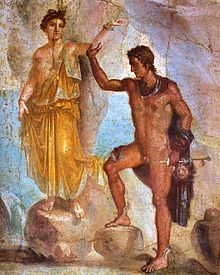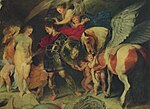Andromeda (mythology)

Andromeda ( ancient Greek Ἀνδρομέδα “in memory of a man”) is the daughter of the Ethiopian king Cepheus and Cassiopeia in Greek mythology .
myth
In order to punish the hubris of her mother Kassiopeia, who, depending on the tradition, thought herself or her daughter Andromeda to be more beautiful than the Nereids , Poseidon sent the sea monster Ketos and a flood . In order to free the land from this plague, Andromeda was forged on a rock by the sea to be sacrificed to the monster on the direction of Poseidon or according to the saying of an oracle , which is generally identified with that of Ammoneion . Pausanias localized the event near Joppa (today Jaffa / Tel Aviv).
Perseus defeated it, freed Andromeda and took her as his wife. At the wedding, however, there was a fight with her uncle Phineus , who had previously asked for her hand and now demanded his rights by force of arms. Only when the fight was almost lost for Perseus did he use the head of Medusa to petrify his enemies. Then he flew with Andromeda to Seriphos with the help of his wing shoes . With him, her parents and the monster ( Ketos ) she was later transferred to the sky as a constellation . As a punishment for her arrogance, however, Cassiopeia stands upside down in the firmament.
Andromeda had numerous children, such as Perses , who - still born in Ethiopia - grew up with his grandfather and became the progenitor of the Persian kings . She also gave birth to Perseus' sons Alkaios , Sthenelos , Elektryon , Heleios and Mestor as well as the daughter Gorgophone . She is the grandmother of Alcmene , Eurystheus and Amphitryon and thus an ancestor of the Telebo king Pterelaos and - officially - of Heracles .
Artist's impression
Andromeda took the following works as their motif:
- Piero di Cosimo (Piero di Lorenzo): Perseus frees Andromeda , oil on panel, 1513
- Giorgio Vasari : Perseus and Andromeda , 1570
- Paolo Veronese : Perseus saves Andromeda , 1576–1578, Musée des Beaux-Arts , Rennes
- Giuseppe Cesari : Perseus frees Andromeda , 1596
- Rembrandt van Rijn : Andromeda chained to the rock (Baroque), commissioned by Dr. Tulip in January 1632
- Peter Paul Rubens : Perseus and Andromeda , 1620/21; Andromeda , 1638
- Domenico Guidi : Andromeda and the sea monster (marble sculpture), 17th century
- Gustave Doré : Andromeda chained to the rock , 19th century
- Tamara de Lempicka : Andromeda , 1927/28
Antique Corinthian vase depicting Ketus, Perseus and Andromeda
See also
literature
- Wilhelm Heinrich Roscher: Andromeda . In: Wilhelm Heinrich Roscher (Hrsg.): Detailed lexicon of Greek and Roman mythology . Volume 1.1, Leipzig 1886, Col. 345-347 ( digitized version ).
- Konrad Wernicke : Andromeda . In: Paulys Realencyclopadie der classischen Antiquity Science (RE). Volume I, 2, Stuttgart 1894, Col. 2154-2159.







